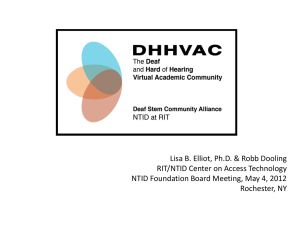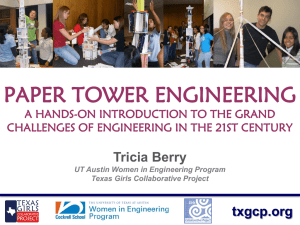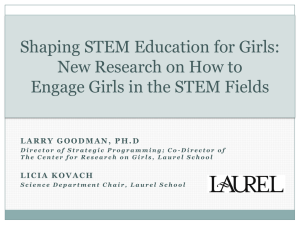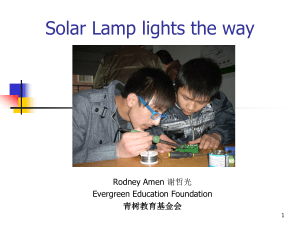Presentation - CRESST
advertisement
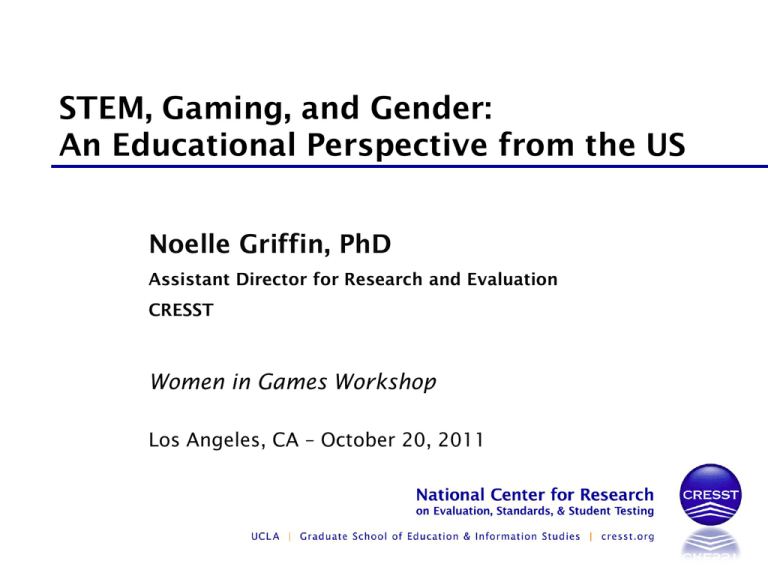
STEM, Gaming, and Gender: An Educational Perspective from the US Noelle Griffin, PhD Assistant Director for Research and Evaluation CRESST Women in Games Workshop Los Angeles, CA – October 20, 2011 Overview • Gender and science, technology, engineering, math (STEM) achievement • Gender and STEM attainment • Gender and educational games - considerations 2 / 15 Gender and STEM Achievement • Historical perspectives Boys outperform girls in math/science Gender differences begin at an early age Gender differences increase with age • More current findings Gender gaps in STEM, if exist, typically small In some situations girls outperform boys Domain makes a difference 3 / 15 Example: NAEP • National Assessment of Educational Progress (2009) • Grades 4, 8, 12; literacy, mathematics, science • Math: Small (2 point) gender difference • Science: Varies by content, grade Overall science: Boys score higher than girls (2-5 points) Life science: No difference or girls score higher 4 / 15 NAEP: Math Gender Differences Figure 1. Trend in fourth-grade NAEP mathematics average scores and score gaps, by gender. Reprinted from “The nation’s report card: Mathematics 2009. National assessment of educational progress of grades 4 and 8,” by National Center for Education Statistics, 2009, p. 11. Copyright 2009 by the National Center for Education Statistics. 5 / 15 NAEP: Example of Other Variation Figure 2. Trend in fourth-grade NAEP mathematics average scores, by eligibility for free or reduced-price school lunch. Reprinted from “The nation’s report card: Mathematics 2009. National assessment of educational progress of grades 4 and 8,” by National Center for Education Statistics, 2009, p. 12. Copyright 2009 by the National Center for Education Statistics. 6 / 15 Example: National High School Graduates Study (2009) • No gender difference in STEM credits earned • Women have higher GPAs • Women more likely to complete mid-level or rigorous curriculum • Women tended to be “missing” more rigorous science requirements 7 / 15 Gender and STEM Attainment • Programme for International Student Assessment (PISA): Engagement, interest, motivation in STEM lower for girls • Although women have increased in some science majors, still under-represented in many • Only @ 20% of physics, engineering, computer science undergrad degrees • Similar trends in doctorate, professorship, career contexts 8 / 15 Women in STEM Careers Figure 3. Women in selected STEM occupations, 2008. Reprinted from “Why so few? Women in science, technology, engineering and mathematics,” by C. Hill, C. Corbett and A. St. Rose, 2010, p. 31. Copyright 2010 by the American Association of University Women. 9 / 15 Research: Potential Psychosocial Sources of STEM Gender Gap • Social learning/modeling • Stereotype threat • Self-efficacy, test anxiety • Opportunity to learn (OTL) • Parent, teacher factors • Peer group influence • Metacognitive factors (e.g., self-regulation) 10 / 15 Gender and Educational Games • Gender differences in gaming persist, but decreasing Game type/format important • Gender considerations in motivational/engagement aspect Narrative/character Social demands Within-group variability • Gender and learning game effectiveness/impact 11 / 15 Gender and Gaming Participation (Chung et al, 2011) Gender differences in reported game play Game Type Mean Difference (Male-Female) Mobile games -.01 Puzzle games -.23 Arcade games .34 First person shooter 1.59* (statistically significant) Action games 1.47* (statistically significant) • Gender differences due to first person/action differences • Self-reported video game efficacy higher for boys, but no difference when first-person shooter experience controlled for 12 / 15 Narrative/Gender in Educational Games (Bittick et al, 2011) • 177 middle and high school students • Math game, 3 versions of narrative (feminine, masculine, neutral) • Key findings: No gender differences in math pre/post tests Masculine narrative –greater learning impact “Matching” of narrative - greater impact for males 13 / 15 Future Directions 14 / 15 griffin@cse.ucla.edu



